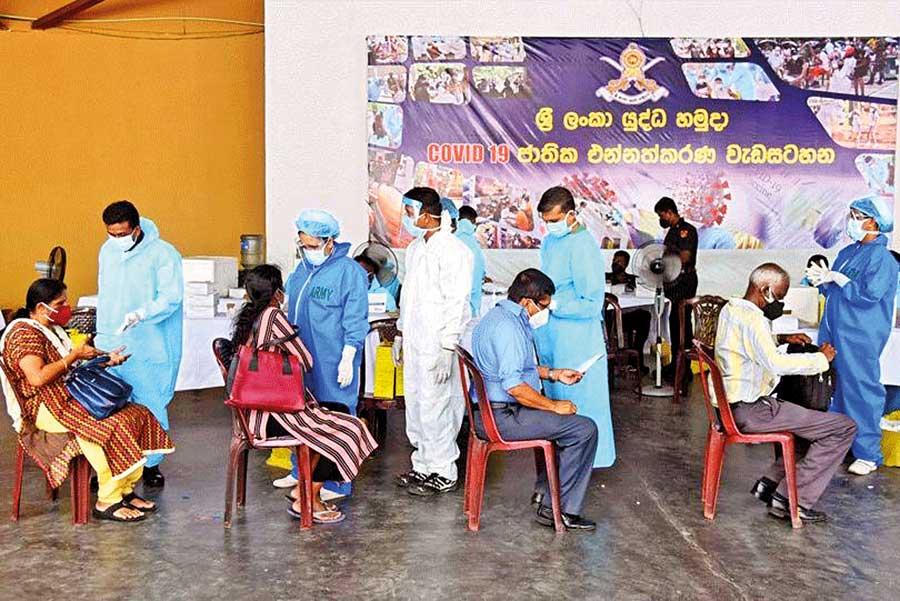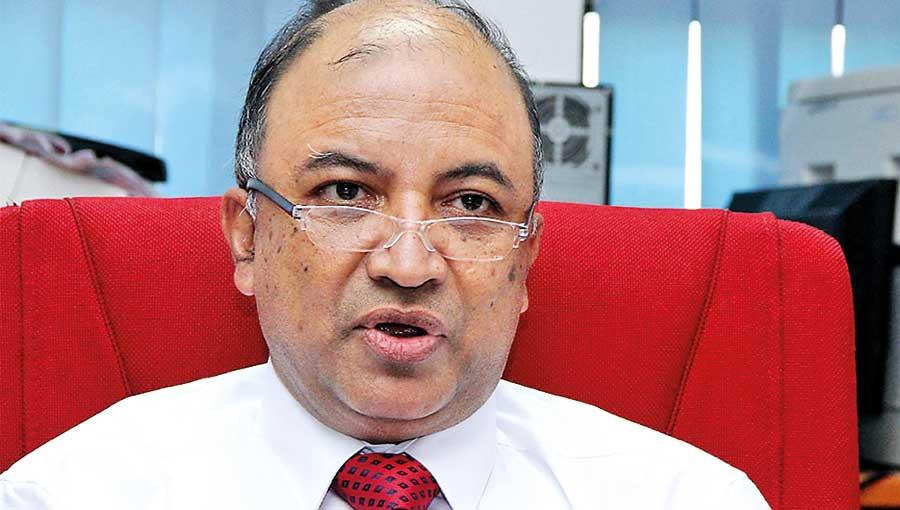Reply To:
Name - Reply Comment

With all the vaccines currently available, booster shots will be necessary as long as the pandemic continues, as effectiveness declines with time.
Sri Lanka is experiencing one of the worst COVID outbreaks since the pandemic first struck the island last year. Photos of hospitals in which COVID wards were filled to the brim with patients went viral on social media a few days back. Although the situation was rectified following the intervention of the State Minister, for how long such short-term strategies would work remain a considerable doubt. The Government later announced that those with mild and moderate symptoms could be isolated and managed at home, but each one of these strategies requires proper implementation. Even with island wide vaccination drives the mortality rate has been high over the past few days. Health experts claim that the present situation could have been avoided if there was less political interference in the scientific decision-making process.
year. Photos of hospitals in which COVID wards were filled to the brim with patients went viral on social media a few days back. Although the situation was rectified following the intervention of the State Minister, for how long such short-term strategies would work remain a considerable doubt. The Government later announced that those with mild and moderate symptoms could be isolated and managed at home, but each one of these strategies requires proper implementation. Even with island wide vaccination drives the mortality rate has been high over the past few days. Health experts claim that the present situation could have been avoided if there was less political interference in the scientific decision-making process.
PCR tests and facilities ignored?
“The Government is not paying attention to increase PCR testing,” claimed Association of Laboratory Specialists President Ravi Kumudesh. “If the Government is properly conducting tests there will be a five-fold increase in the number of cases that are being detected daily. With the limited data available we cannot forecast what will happen in the coming weeks. There were allocations to bring down 30 Rapid PCR machines and this quantity was reduced to 14. But to date, none of these machines were bought. There are 16 places conducting Rapid PCR tests using machines given by donors. So what happened to the machines that were supposed to be brought down by state funds.
"Health experts claim that the present situation could have been avoided if there was less political interference in the scientific decision-making process"
“What we suggest is that the Rapid PCR system should be decentralised and by conducting essential PCR tests the number of deaths could be reduced. The Ministry of Health never includes any Laboratory technologist in their meetings. If we have simple machines we can get results quickly. If we get down complex machines it’ll take time to get results. So what needs to be done is to improve Rapid PCR tests and facilities, so that these could be used in virology post-COVID,” said Kumudesh.
"With the limited data available we cannot forecast what will happen in the coming weeks. There were allocations to bring down 30 Rapid PCR machines and this quantity was reduced to 14. But to date, none of these machines were bought - Ravi Kumudesh"
An overburdened health service
Speaking further Kumudesh said, “So far two healthcare workers have succumbed to COVID and there are around 1000 nurses who have tested positive for COVID,” opined Government Nursing Officers Association President Saman Rathnapriya. “Treatment centres are full and healthcare workers are working at their own risk. They too have children, parents and without proper safety measures they will be virus carriers as well. On the other hand the WHO has recommended healthcare workers to wear N95 facemasks, but they aren’t provided by the Health Ministry. Our healthcare workers wear surgical masks. Some establishments that have been put up as COVID centres are being removed and there’s no place to obtain treatment. As a result, healthcare workers are overburdened with the workload.” said Rathnapriya.
"The Ministry of Health never includes any Laboratory technologist in their meetings"
He further said that so far there are 38,000 nurses in Sri Lanka and this number has to be increased to 55,000. “The Government issued a circular asking Government servants to report to work. But there’s special leave granted for pregnant women. However this is not applicable to pregnant nurses. So we urge the government to consider their wellbeing as well because it is unfair for them to be reporting to work when pregnant women in the government sector are allowed to stay home.” he said.
"The Government issued a circular asking Government servants to report to work. But there’s special leave granted for pregnant women. However this is not applicable to pregnant nurses. So we urge the government to consider their wellbeing as well - Saman Rathnapriya"
Failed public health control strategies
Even though medical experts kept warning that Sri Lanka should continue its PCR testing and surveillance, a year after the outbreak happened, Sri Lanka still seems to be lagging behind in many aspects. International medical researcher and Director at Institute of Health Policy Dr. Ravindra Rannan-Eliya in an interview with the Daily Mirror said that political leaders will have to adopt a new public health control strategy and implement it if Sri Lanka is to recover from this aggravating health crisis.
"Highly vaccinated countries, like UK, USA and Israel which used mainly Pfizer and Astra Zeneca, are all planning to give boosters this year. However, in our situation where most Sri Lankans have not been fully vaccinated, booster shots are not the priority to control matters. Our current need is to give first shots to those who have not had any - Dr. Ravindra Rannan-Eliya"

Excerpts :
Q Hospitals, both government and private, are full and hotels too are brimming with COVID patients. Do you think Sri Lanka will be able to manage the situation in the coming weeks?
It is quite likely that demand for beds will increase further. Inevitably this means that fewer infected people in the community will be isolated, which means transmission will increase further. Fewer beds for patients who need care means that more people will die. Sri Lanka will manage, but it will be at the cost of significant disruption to the health services, significant economic damage, and many hundreds or thousands of deaths that could have been avoided.
Q Many senior citizens are succumbing to the virus as they haven’t received the vaccination. Vaccination drives didn’t happen according to the scientific process and priority wasn’t given to vulnerable groups. Your comments?
Priority in vaccination should have been given from the start to three groups: (I) those who work at our borders and come into contact with international arrivals, ie airline crews, airport staff, quarantine workers, etc, in order to slow down the entry of virus and new variants (ii) those who come into contact with COVID patients, ie health workers and security forces; and (iii) the vulnerable, ie elderly. Our vaccination plan did address this partly, although it was insufficient for the first group. Why a scientific process and the plan that was developed was not followed appears to be a political decision. As a scientist, I cannot explain it. You need to ask those responsible for their rationale.
Q Will administering booster shots help in controlling the situation?
With all the vaccines currently available, booster shots will be necessary as long as the pandemic continues, as effectiveness declines with time. Highly vaccinated countries, like UK, USA and Israel which used mainly Pfizer and Astra Zeneca, are all planning to give boosters this year. However, in our situation where most Sri Lankans have not been fully vaccinated, booster shots are not the priority to control matters. Our current need is to give first shots to those who have not had any, plus the second shot to those who have got one. We also need to vaccinate children. Only when this has been done does it make much sense to start giving boosters. That said, the Government should start paying cash to secure booster shots now, since their current COVID strategy is failing to control transmission, so we should be planning for high levels of transmission through 2022.
Q What steps should the Govt. take to control a severe outbreak at this moment?
Nothing has changed within the past 18 months. What we need to do to control the virus remains largely the same as in mid-2020. The only difference is that we now have vaccines, but the virus is also twice as infectious as before, so we are largely back to square one in terms of control. For the Government to control this, two things have to happen initially. The political leaders have to decide that they must prioritise controlling transmission to prevent Sri Lankans dying to prevent bigger economic damage, and to prevent further damage to their own political prospects. Second, they need to accept that the public health control strategy that they adopted failed and has failed repeatedly, and that they need to adopt a new strategy based on a different scientific perspective, and then implement it. Without these two things happening the Government will not be able to control the outbreak and prevent thousands more Sri Lankans dying.
"As far as the Delta variant is concerned 80% have mild to moderate symptoms and they could be kept home. 5-15% have severe symptoms and they need hospital-based care. Another 5% are critical and they need ICU care. -Dr. Ruvaiz Haniffa"
Home-based management of COVID patients
In August 2020 the WHO announced that asymptomatic patients could be quarantined at home. A year later, Sri Lanka issued a circular on ‘Integrated Home-based Isolation and Management of Mildly Symptomatic and Asymptomatic COVID-19 patients’. The circular defined asymptomatic patients as laboratory confirmed cases not experiencing any cases of oxygen saturation at room temperature of more than 96%. On the other hand, mildly symptomatic cases are Laboratory confirmed individuals with upper respiratory tract infections, with or without fever, other associated symptoms and no shortness of breath and having oxygen saturation at room temperature of more than 96%.
"Despite medical experts warning that PCR testing and surveillance should continue Sri Lanka still seems to be lagging behind in many aspects"
The circular further reads that the area MOH and the medical team will be responsible for the triage of PCR positive patients. But often there are complaints that the area MOH is out of reach. “Why is it that only state medical officers are used in this purpose” questioned Consultant Family Physician and former President of Sri Lanka Medical Association Dr. Ruvaiz Haniffa. “People have general practitioners, either government or private and they have good doctor-patient relationships. So why can’t the government get their help in this process? Why have they been excluded when they have volunteered to help to stop the spread of disease?
"The circular further reads that the area MOH and the medical team will be responsible for the triage of PCR positive patients. But often there are complaints that the area MOH is out of reach"
“On the other hand the patient shouldn’t decide if he will stay home or go to hospital. If they feel they have symptoms they should contact a doctor, which is anybody who is willing to help. Not only the designated MOH. As far as the Delta variant is concerned 80% have mild to moderate symptoms and they could be kept home. 5-15% have severe symptoms and they need hospital-based care. Another 5% are critical and they need ICU care. So this is a good way to offload the overburdened system. Then we need to look at the safety of caretakers which hasn’t been addressed here.” said Dr. Haniffa.

“No question of hospitals exceeding capacity” – Dr. Herath
Even though hospitals seem to be reaching maximum capacity, public health experts claim that the public need not worry. Deputy Director of Health Services Dr. Hemantha Herath during an interview with the Daily Mirror requested the public to assist the authorities to stop the spread of disease.
Excerpts:
Q Is there a plan to vaccinate those between 18-30 years?
Once the above 60 group is completed we will look at other age groups. We will be considering vaccinating those between 18-30, but I cannot give an exact date as to when it would happen. Hopefully it’ll happen in the coming weeks.
Q How about the availability of booster shots?
Boosters are given at least after one year of vaccination. There’s an accepted time limit to give booster doses and yearly booster doses are the accepted system. Once the vaccine is established we need to look at immunity development. We need to analyse if immunity levels are going down and based on those data we can consider administering booster shots.
"Boosters are given at least after one year of vaccination. There’s an accepted time limit to give booster doses and yearly booster doses are the accepted system. Once the vaccine is established we need to look at immunity development. We need to analyse if immunity levels are going down"
Q What is the Government’s strategy to minimise the inflow of COVID patients at hospitals in the coming weeks?
It is those hospitals and centres meant for COVID that are exceeding capacity. Around 25% of hospital beds are used for COVID as we have to operate other services as well. There’s no question of hospitals exceeding capacity.
Q Is there a reduction in PCR testing?
PCR testing has been gradually increased. During the previous 24 hours close to 18536 tests have been done. We are also doing 10,000-12,000 Rapid Antigen Tests daily.
Q Your message to the public.
Don’t look at hospital or oxygen capacities and wait. Nothing can be solved if we allow new cases to rise. The public should help health services to minimise the spread of disease by adhering to health guidelines as much as possible.